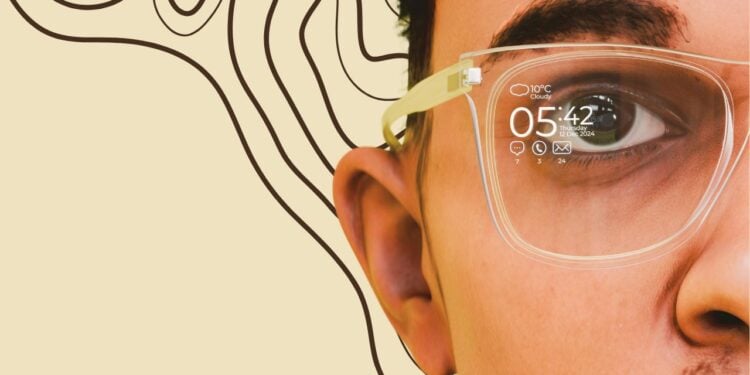- Solos smart glasses with ChatGPT streamline tasks by providing voice-driven assistance, real-time reminders, and seamless communication through whispers, music, and calls—making them ideal for multitasking in hybrid and remote work environments.
- The always-on nature of these glasses, with potential for recording and biometric data collection, raises privacy risks in the workplace, particularly regarding data misuse and surveillance.
- Smart glasses could lead to unauthorized recording and harassment in the workplace, while also increasing pressure to stay constantly connected, potentially contributing to burnout and undermining work-life balance.
Do you wish your eyeglasses could whisper things to you during a work presentation?
Well, wish granted. At this year’s CES tradeshow in Las Vegas, tech companies showcased groundbreaking innovations, and one product in particular has the potential to change how we work, communicate, and even experience daily life: Solos smart glasses.
With OpenAI’s ChatGPT built directly into the frame, these glasses promise to be a game-changer in the field of augmented reality (AR) and wearable tech.
They have voice-driven assistance, allowing wearers to interact with the AI for real-time answers and reminders, and they even whisper text messages, notifications, and emails aloud through integrated speakers.
Some models have cameras included and recording capabilities. They also feature built-in audio for music, podcasts, and calls, making them a versatile tool for multitasking.
But as we look to the future of work, there are several concerns and challenges we must address before embracing this new wave of AI-enabled eyewear.
The Rise of Smart Glasses: A Glimpse Into the Future of Work
Solos smart glasses are a significant development in the field of personal technology.
These glasses are equipped with AI-powered assistants, capable of providing voice-driven assistance, playing music or podcasts, and taking calls — all while seamlessly integrating into your daily routine.
Whether you’re wearing prescription lenses or trendy sunglasses, the modular design allows for easy switching of lenses, making these glasses not just practical, but customizable. With a starting price of $249, these glasses offer a somewhat affordable entry into the world of wearable AI.
But what does this mean for the future of work? As the world increasingly shifts toward remote and hybrid work environments, professionals are becoming more reliant on tech tools to manage their day-to-day tasks.
The ability to ask a pair of smart glasses for reminders, have a conversation with an embedded AI assistant like ChatGPT, or get real-time updates from an email or calendar while maintaining focus on your work may seem undeniably appealing to some.
For workers in industries that demand multitasking or frequent travel, smart glasses like Solos could eliminate the need for constantly switching between devices.
Imagine asking your glasses to pull up important information during a video conference, or receiving a text that’s read aloud to you while walking between meetings.
In the office or out in the field, these tools could make workers more efficient, more connected, and more productive.
Privacy Concerns with Smart Glasses
These glasses are essentially always-on devices with embedded AI assistants and cameras that can continuously monitor, record, and analyze the wearer’s environment.
This raises significant questions about data ownership, consent, and surveillance.
For instance, the glasses have the capability to capture not only audio but also visual data — such as conversations or interactions in public and private spaces — potentially without the wearer’s explicit awareness of what is being recorded at all times.
With constant connectivity and seamless integration into daily activities, there’s a risk that sensitive business or personal information could be captured and transmitted to cloud servers, where it could be vulnerable to data breaches, misuse, or unauthorized access.
The collection of biometric data, like facial recognition or even emotional states, opens the door to exploitation by third-party companies, advertisers, or even employers who might use this data for behavioral tracking, targeted advertising, or employee monitoring.
Given the sheer volume of data these glasses can gather, it is essential that robust privacy controls and clear opt-in policies be established to ensure users’ autonomy over what is shared, how it is used, and who has access to it.
Women Could be Particularly Negatively Affected
In addition to general privacy risks, there are specific challenges related to how workers might misuse these technologies, particularly cameras and recording capabilities, leading to an increase in sexual harassment or surveillance in professional environments.
Here’s why:
1. Perceived Lack of Consent and the Risk of Misuse
The camera in Solos smart glasses has the potential to be used for unauthorized recording.
If one coworker wears these glasses, the device’s camera could be used to record another coworker in the office without their knowledge or consent.
This raises the risk of voyeuristic behavior and harassment, as the technology might go unnoticed or be disguised as a simple tool for productivity.
The risk of such abuse is amplified when employees feel compelled to use this technology as a workplace norm.
Unlike smartphones, which have more obvious and easily manageable privacy settings, wearables like smart glasses can easily be concealed and may not provide workers with adequate control over when and how their personal data is collected.
This lack of control could make women, in particular, more vulnerable to unwanted surveillance, sexual harassment, and other privacy violations.
Workplace sexual harrassment is no joke either: 38% of all women and 14% of men have reported experiencing sexual harassment at work — which is an extremely unfortunate statistic that workplace leaders need to take into account when implementing new workplace tech.
2. Impact on Social and Professional Interactions
With smart glasses offering seamless communication and real-time information, all workers — and likely more so women — might face additional pressure to stay connected or respond to colleagues at all hours.
The blurred boundaries between work and personal life could be more burdensome for women, who are often expected to juggle multiple roles both at home and at work.
Women may feel compelled to use the glasses to stay responsive, despite the personal cost, as the AI assistant might push notifications at all hours or provide constant updates from male colleagues.
The constant demand for availability could contribute to burnout, particularly if women feel they must engage with the technology more intensively to prove their commitment to the job.
New Tech Can be a Double-Edged Sword
The rise of AI-enabled smart glasses, exemplified by products like Solos, promises unprecedented advancements in how we work, communicate, and interact with the world around us.
The integration of technologies like ChatGPT into wearable devices could streamline tasks, improve productivity, and offer a level of convenience previously reserved for science fiction.
However, we must tread carefully when it comes to the gendered impact and privacy implications of these technologies.
As these devices become ubiquitous, it’s essential that companies not only ensure that users are well-informed about the data being collected, but also give them the tools to control and limit what’s shared.
Otherwise, we risk entering an age where our personal lives are no longer private, and technology companies hold even more power over our daily experiences than they already do, and far more than we realize.



 Dr. Gleb Tsipursky – The Office Whisperer
Dr. Gleb Tsipursky – The Office Whisperer Nirit Cohen – WorkFutures
Nirit Cohen – WorkFutures Angela Howard – Culture Expert
Angela Howard – Culture Expert Drew Jones – Design & Innovation
Drew Jones – Design & Innovation Jonathan Price – CRE & Flex Expert
Jonathan Price – CRE & Flex Expert















